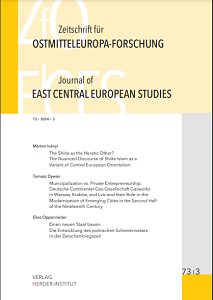Municipalization vs. Private Entrepreneurship: Deutsche Continental-Gas-Gesellschaft Gasworks in Warsaw, Kraków, and Lviv and their Role in the Modernization of Emerging Cities in the Second Half of the Nineteenth Century
Municipalization vs. Private Entrepreneurship: Deutsche Continental-Gas-Gesellschaft Gasworks in Warsaw, Kraków, and Lviv and their Role in the Modernization of Emerging Cities in the Second Half of the Nineteenth Century
Author(s): Tomasz DywanSubject(s): Energy and Environmental Studies, Economic history, Environmental and Energy policy, Rural and urban sociology, Economic development, 19th Century
Published by: Verlag Herder-Institut
Keywords: Warsaw; Lviv; Kraków; Deutsche Continental-Gas-Gesellschaft; urban modernization; gasworks; municipalization; municipal companies;
Summary/Abstract: The article discusses the mid-nineteenth-century introduction of gas production technology by the Deutsche Continental-Gas-Gesellschaft to the emerging cities in the area of the former Polish-Lithuanian Commonwealth, namely Warsaw, Lviv, and Kraków. During the 1870s and 1880s, the local governments of Kraków and Lviv, dominated by Polish influences, sought to portray themselves as agents of modernization. Consequently, the arrival of a German investor implementing unfamiliar gas production technology was unwelcome. This resulted in the takeover (in Lviv) or buyout (in Kraków) of the gasworks in operation. In contrast, Warsaw, under the administration of Russia, reached an agreement with the concessionaire. Modernization of the gas industry in these cities commenced in the late nineteenth century, with management falling under both municipal (Kraków and Lviv) and private (Warsaw) entities. This allowed for the expansion of the gasworks and a subsequent increase in gas consumption, as facilitated by the reduction in the product’s price. However, Kraków and Lviv managed to present themselves as the architects of this favorable situation. Meanwhile, the authorities in Warsaw permitted the Dessau company to operate within the city, which engendered discontent among the Polish intelligentsia in the early twentieth century. In Germany and the Habsburg monarchy, it was customary for cities to municipalize their gasworks, with the profits channeled back into city budgets. This aspect of urban modernity, as it was perceived at the time, was absent in Warsaw.
Journal: Zeitschrift für Ostmitteleuropa-Forschung
- Issue Year: 73/2024
- Issue No: 3
- Page Range: 401-429
- Page Count: 29
- Language: English

